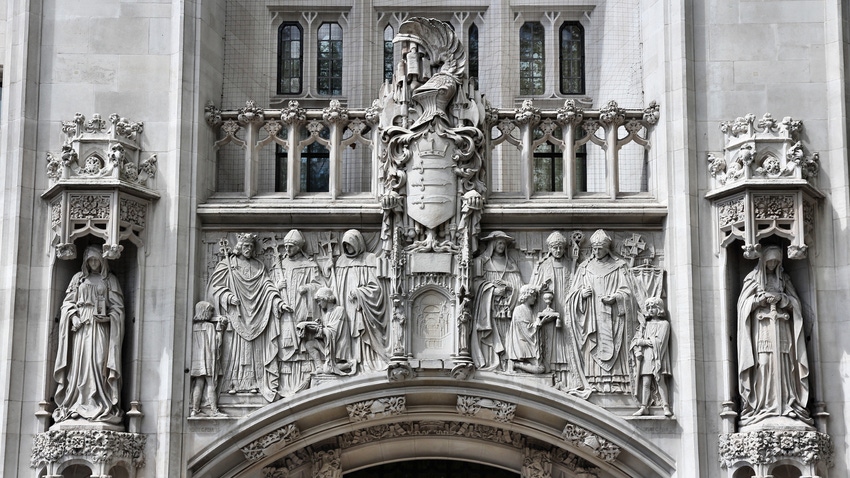AI Cannot Be Inventors on Patents, UK Supreme Court Rules
The quest for DABUS to obtain patent protection for AI-generated inventions fails again

At a Glance
- The U.K. Supreme Court has affirmed earlier rulings that AI systems cannot be listed as inventors on patents.
AI systems cannot be listed as an inventor on a U.K. patent application, the country's Supreme Court ruled today in a landmark decision.
The ruling affirms a High Court decision that an inventor must be human. The case was part of a long-running legal battle relating to two inventions created by DABUS, an AI system developed by computer scientist Stephen Thaler.
In 2018, he listed DABUS as the inventor of two products: a new kind of food or beverage container and a new type of light beacon for emergencies. But the U.K. Intellectual Property Office (UKIPO) denied inventorship to DABUS on the grounds that the AI system was not a person. Thaler appealed that decision but his arguments were dismissed by both the High Court and the Court of Appeal, with the case finding itself before the Supreme Court.
In today's ruling, Lord David Kitchin writing for the Supreme Court concluded that "DABUS is not a person or persons and ... it is not a tenable interpretation of the 1977 Act that a machine can be an inventor."
Thaler’s appeal focused on the interpretation and application of the U.K. Patents Act of 1977 – arguing that because he owned the machine, he was entitled to pursue patent protection for the inventions generated by it.
The Supreme Court unanimously dismissed the appeal, holding that the UKIPO’s decision was right. Lord Kitchin wrote that the office was “entitled to hold that Thaler did not satisfy either of the requirements in section 13(2) of the 1977 Act: he failed to identify any person or persons whom he believed to be the inventor or inventors of the inventions described in the applications.”
Lord Kitchin also wrote that Thaler’s ownership of DABUS “did not provide a proper basis for accepting his claim to be entitled to the grant of the patents for which he had applied.”
Professor Ryan Abbott from the University of Surrey, who had argued the case for Thaler, told AI Business that "the U.K. Supreme Court held AI is not an inventor, even when it makes the creative leap behind an invention. Instead, AI, at best, can be a 'highly sophisticated tool' that can be used by people who invent. This affects the meaning of an 'inventor' under U.K. patent law, and to be an inventor, one need not make the creative leap behind the invention, as had been previously assumed. Accordingly, companies who use AI to develop products will have to say they or their employees are the inventors, even when the humans involved do little else but switch on the computer."
But Nick White, a partner at law firm Charles Russell Speechlys, said legal precedent prevailed. “As AI systems continue to advance in sophistication and capability, there is no denying their ability to generate new and non-obvious products and processes with minimal, or perhaps even without any, ongoing human input," he said. “Nevertheless, the legal framework remains firmly rooted in historical context, and it does not recognize AI systems as inventors under patent law, or as capable of owning IP. Change may be on the horizon but it will most likely come from the policymakers, rather than the judges."
The U.K. Supreme Court’s ruling is the latest in a long line of setbacks for Thaler and his attempts to obtain patent protection for DABUS. He has been routinely denied in Europe and the U.S., with an appeal to the U.S. Supreme Court failing in April.
DABUS does hold patent protection in one country – South Africa. DABUS was awarded inventorship in August 2021 by the country’s Companies and Intellectual Property Commission (CIPC), however, the country’s IP laws lack a formal definition of an inventor in its patent laws. Adding to that, compliance with formal requirements such as noting the inventor would effectively put a request in good stead to be granted.
Thaler has also previously sought to obtain copyright protection for works generated by another AI system he created but has faced similar pushback, losing a U.S. court case back in August.
The Supreme Court’s decision follows the recent U.K. ruling that AI inventions using a machine learning approach can be patented. The decision could lead to more AI patents being granted – just not patents for inventions made by AI.
About the Author(s)
You May Also Like


.jpg?width=700&auto=webp&quality=80&disable=upscale)
.jpg?width=700&auto=webp&quality=80&disable=upscale)
.jpg?width=700&auto=webp&quality=80&disable=upscale)
.jpg?width=300&auto=webp&quality=80&disable=upscale)
.jpg?width=300&auto=webp&quality=80&disable=upscale)
.jpg?width=300&auto=webp&quality=80&disable=upscale)

.jpg?width=300&auto=webp&quality=80&disable=upscale)